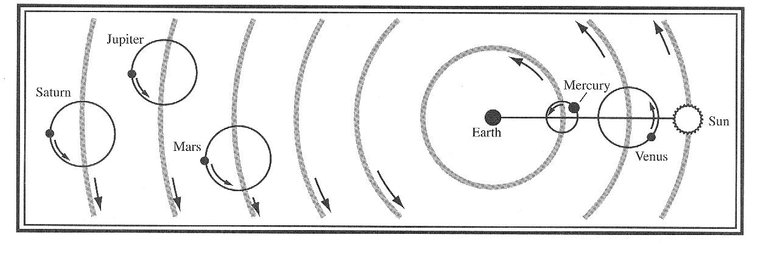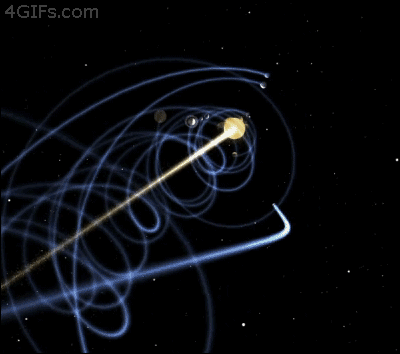Since the dawn of Civilization, or one may say even before, humans have tried to explain in various ways the World which surrounded them. Firstly through Legends and Myths, later with Philosophy and today we do it with Science.
In this series of posts we will analyze the process we use to understand and explain simple or complex phenomena that we experience everyday of our life, even though we may not notice them.
Of course, everything we will cover must be Real (in the strict sense) and, directly or indirectly, observable.
We all experience the world through our senses and, unless you are born blind or with some serious low vision issue, your eyes are your main doors to the world. So everything we see with our own eyes must be Real, must perfectly represent Reality, right? Well…
What is Real?
In 2004 the council of the town of Monza,Italy prohibited to keep goldfishes in round bowls because it is cruel to give them a distorted view of Reality. But how can we be sure our view of Reality is the true one and that our perception of it is not also distorted by some invisible lens? In fact, inside the bowl, the goldfish could formulate a valid description of its Reality and even a set laws that will predict events like the trajectory of a falling object just as we can do, therefore the equations derived by the distorted view of the goldfish will not be less valid than ours, even though it would be more complicated.
In Ptolemy’s Almagest (AD 150) we find a description of the universe portraying the Earth at the center of the universe with the Sun, Planets and other stars revolving around it. Ptolemy obtained his results using epicycles, which are like wheels on wheels, to describe the motion of celestial bodies.
The description Ptolemy formulated was somewhat accurate and allowed to predict where and when a specific planet or star could be found in the sky, but Ptolemy’s Geocentric System does not correspond to the Reality we know.
We are used to an Heliocentric model, the Solar System, which has the Sun at rest in the center and the planets revolving around it, even though this is also an oversimplification of it since the Sun, along with the whole solar system, moves at about 230 km/s (143 mi/s) relative to the center of the Milky Way.
Both Geocentric and Heliocentric Theories are valid models of our universe, but the real advantage of the Heliocentric System was that the equations of motion are simpler in the frame of reference where the Sun is at the center, moreover it revealed to be consistent and accurate over time.
Absolute Reality should not depend on models, but our Reality is.
Reality in fact is perceived as the product of our interpretation of the world and depends on it.
This interpretation is given to our brain by our senses which are the medium from our brain and the Reality we live in.
In the next Post and first Chapter we will talk about the senses as mediums, the science that makes them work and what role they play in The Mechanics of Understanding.
Thanks for reading!
This was the first and brief introduction on this new series, if you want to read more or if you like it, consider to upvote and follow, it helps me out a lot!
Moreover, make sure to comment and give a solid feedback, it would be great to hear your opinion on the series!



Finally, I found a little time to read your articles.
I think, they are good written and interesting topic so far :-) I like the imagination, that things may change with your point of view - even if it's a common technique in science to define the system in a way, that it is easier to find the right formula. We know it from mathematics (like which coordinate system is the best - meaning not that every other system may be false, just because it is not rectangular) or from the heliocentric model as you described it above.
I followed you and look forward to your next articles!
Wow thanks, I was not expecting such a good review. I'm sure I still have to work on my writing skills despite your kindness :-) Maybe today or tomorrow I'll post the next article and I'll be happy to hear your opinion on that one too. Anyway, I'm waiting for your next post as well ;-)
Well, perhaps are the expectations of what makes a good article different. For myself, I can follow your content. At least for now ;-)
My next article will probably come on the next weekend. It always takes more time than expected and therefore, it is easier for me to write on weekends. Maybe I can finish more articles and spread them over the week, but we'll see ;-)
That's what I am doing for now. I make drafts of the articles in the weekend and during the week, often in the evening, i make them readable so that I can publish them when I feel they are not so bad :-) I'll wait for your next post then, hoping that it will be bilingual, since I'm using your posts to improve my weak German ;-)
Lol. That is surely one way to learn a language. But I have to admit that you cannot translate the posts word-for-word. Besides, my German is much better than my English and so the text may be more pointed out ;-)
Yes, I agree. I already know a little bit of German, but I'm not so confident with it, so reading your posts may be good for strengthening my knowledge :-)
Good work, excellent article, I've just resteem it...
Thank you so much! I really appreciate it!
meep
I agree.
meep
As a passionate for science, philosophy and facts I really enjoyed your article. Following for further posts :) Keep it up!
Thanks! The next post will come very soon ;-)
Great work! Very thoughtful; our interpretation of reality also governs our actions. For example, if someone strongly believes the geocentric model then they would act in a specific way when confronted with alternative views (heliocentric model). It is our perception of reality that dictates our actions. :)
Ptolemy is correct.